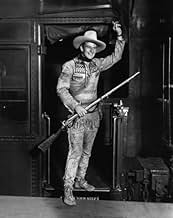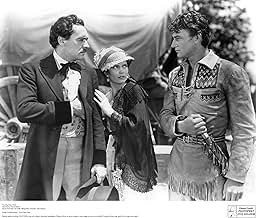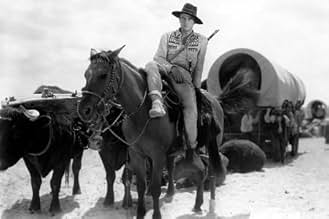Aggiungi una trama nella tua linguaBreck Coleman leads hundreds of settlers in covered wagons from the Mississippi River to their destiny out West.Breck Coleman leads hundreds of settlers in covered wagons from the Mississippi River to their destiny out West.Breck Coleman leads hundreds of settlers in covered wagons from the Mississippi River to their destiny out West.
- Regia
- Sceneggiatura
- Star
- Premi
- 5 vittorie totali
- Red Flack
- (as Tyrone Power)
- Wagon Train Man
- (non citato nei titoli originali)
- Pioneer
- (non citato nei titoli originali)
- Indian
- (non citato nei titoli originali)
- Sid Bascom
- (non citato nei titoli originali)
- Pioneer
- (non citato nei titoli originali)
- Wrangler
- (non citato nei titoli originali)
- Pioneer Child
- (non citato nei titoli originali)
Recensioni in evidenza
Early movies could use or consult people WHO HAD BEEN THERE. Of course, USC quarterback John Wayne, or even Irish thespian Tyrone Power, Sr. (who tried farming and hated it) are exceptions, but there is a ring of authenticity with "The Big Trail" which you can't get second hand. And if those aren't real plains Indians by the hundreds, I'll eat my breech clout!
And the scenery! Unfortunately, cinematographers hadn't mastered filters, so the sky is always washed out, and dust and haze obscure the deep focus. But even these limitations paradoxically serve to provide a feel of endless horizons. And the locations are spectacular, especially the Indian village, which is so enormous that at first I thought half of it was backdrop. Then, there is the spectacular rope drop of animals and equipment down an escarpment that could have inspired Herzog's "Fizcarraldo".
Of course, the acting is hammy and dialog corny, but remember, The Big Trail is from 1930 and that early sound movies had yet to evolve fully from silent film technique, which called for pantomime, with its exaggerated facial expression and movement. Also bear in mind that the style of reading lines came directly from the theater stage from which lines, lacking voice amplification, were delivered as oratory to be heard in the back rows.
Robert Flaherty in his landmark documentary "Nanuk of the North" actually set up his scenes dramatically. He was by no means a fly on the wall. If Flaherty could have made a documentary about the epic journey of a pioneer wagon train through the great Western prairies, I doubt if he could have achieved much greater impact than "The Big Trail".
The plot is rather similar to CIMARRON--a Western that came out the following year and which captured the Oscar for Best Picture. Unfortunately, CIMARRON isn't all that great a film and I actually like THE BIG TRAIL more due to the scope of the film. While some might balk at THE BIG TRAIL's slow-moving pace, I saw it as a great history lesson about the hardships endured by those traveling West on wagon trains. Plus, the whole thing just looked so beautiful, as director Raoul Walsh went to significant trouble to film on location and THE BIG TRAIL looks almost like a film version of some Ansel Adams prints.
As for the acting, it was pretty good. This was a major break for young John Wayne--as his previous screen appearances were, at best, minor and unremarkable. Here, he was given the lead and did a dandy job--though he was obviously young and a little less "John Wayne-ish" than he was in later films, as his screen persona was not yet firmly established. Another interesting part was played by Tyrone Power II (Tyrone Power's father). He looked nothing like his extremely handsome son and looked and sounded almost exactly like Bluto from the Popeye cartoons! He made very few sound films--dying just a year after making this film--so it's a rare opportunity to see and hear this once famous actor.
Overall, the film is well worth seeing despite some sound problems and a few overly long scenes here and there. For 1930, it was a remarkable achievement--more so than the much more famous and award-winning CIMARRON made the following year. Much of the reason THE BIG TRAIL didn't win an Oscar most likely was because ALL QUIET ON THE WESTERN FRONT came out the same year and it is truly one of the great films.
The Big Trail itself is a wonderfully modern-seeming western compared to other entries of the early sound era. It has an air of authenticity about it, as there is almost a documentary feel of the film in its depiction of harsh life on the Oregon Trail. Finally, there is the reason most people view this film - the birth of John Wayne's cowboy persona, not a cartoon character with either a black or white hat as many actors in the early westerns were, but a character of flesh and blood whose motivations you could understand and empathize with. Also note the presence of Ward Bond in a supporting role who, along with John Wayne, was a staple of the later John Ford westerns.
Despite its technical beauty and the presence of John Wayne, this film flopped at the box office. John Wayne went back into obscurity and did not emerge again until nine years later in "Stagecoach", where he played a part very similar to the one he plays here.
Lo sapevi?
- QuizIncredibly, six different versions of this film were shot simultaneously: (1) a 70mm version in the Grandeur process for exhibition in the biggest movie palaces, (2) a standard 35mm version for general release, (3) a 35mm alternate French-language version La piste des géants (1931)', (4) a 35mm alternate Spanish-language version La gran jornada (1931), (5) a 35mm alternate German-language version Die große Fahrt (1931), and (6) a 35mm alternate Italian-language version Il grande sentiero (1931). The four alternate-language versions were shot with (mostly) different casts.
- BlooperBased on the 26 star flag (1837-1845), the film takes place in the 1840s. Many of the settlers use Springfield Model 1873 "trapdoor" rifles. This was common in Hollywood because the 1873 was based on the 1861 rifled musket, which closed a continuous line of muskets going back to 1795, so it easily could stand in for a muzzle loading musket to the untrained eye.
- Citazioni
Breck Coleman, Wagon Train Scout: We can't turn back! We're blazing a trail that started in England. Not even the storms of the sea could turn back the first settlers. And they carrie dit on further. They blazed it on through the wilderness of Kentucky. Famine, hunger, not even massacres could stop them. And now we picked up the trail again. And nothing can stop us! Not even the snows of winter, nor the peaks of the highest mountain. We're building a nation and we got to suffer! No great trail was ever built without hardship. And you got to fight! That's right. And when you stop fighting, that's death. What are you going to do, lay down and die? Not in a thousand years! You're going on with me!
- Curiosità sui creditiOpening credits prologue: DEDICATED- To the men and women who planted civilization in the wilderness and courage in the blood of their children.
Gathered from the north, the south, and the east, they assemble on the bank of the Mississippi for the conquest of the west.
- Versioni alternativeFilmed in two versions simultaneously: widescreen process Grandeur in 70mm, and in standard 35mm. Some scenes were shot simultaneously in both formats; other scenes were shot twice, once for each format. The two versions are not identical in content - the 70mm version runs 125 minutes, while the 35mm version runs a shorter 108 minutes (but does contain some scenes not found in the longer widescreen version).
- ConnessioniAlternate-language version of La gran jornada (1931)
I più visti
- How long is The Big Trail?Powered by Alexa
Dettagli
Botteghino
- Budget
- 2.000.000 USD (previsto)
- Tempo di esecuzione
- 2h 5min(125 min)
- Colore








































